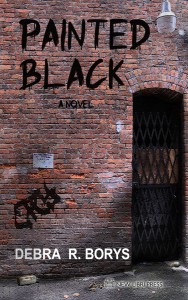An Interview with Debra R. Borys: Freelance Writer & Author
Sylvia: Hi Debra, it is such a pleasure to interview you. Please give our readers a brief introduction of yourself and a little about your book.
 Debra: I spent eight years volunteering with the homeless on the streets of both Chicago and Seattle. I am a freelance writer and the author of several published short stories and am currently working on a second novel in the Jo Sullivan series which combines mystery and suspense with the reality of throw away youth striving to survive.
Debra: I spent eight years volunteering with the homeless on the streets of both Chicago and Seattle. I am a freelance writer and the author of several published short stories and am currently working on a second novel in the Jo Sullivan series which combines mystery and suspense with the reality of throw away youth striving to survive.
Though I live in Seattle now, I am still channeling the lessons I learned on the streets of Chicago. I am surrounded here by mountains and ocean and emerald green trees. Solitude and peace can be found a short drive from home. But until the human element can find a way to treat themselves and each other with respect and understanding, there is ugliness out there as well. Face the ugliness, I say, and tell it to go to hell.
Sylvia: What inspired you to write your first book?
Debra: The original idea for the suspense plot came from a news article I read years ago in the Chicago Tribune. It was about a  new method of preservation being used by taxidermists who freeze dry people’s pets to produce lifelike replicas that would last indefinitely. One person they interviewed stated that freeze drying could be used on people as well, and compared the process to cooking pizzas in an oven. He sounded so bizarre and unconcerned that it immediately sparked an idea for a character based on him and became the premise for my story. In my research, I actually found an article in a mortuary magazine about a firm that did preserve a man in this manner.
new method of preservation being used by taxidermists who freeze dry people’s pets to produce lifelike replicas that would last indefinitely. One person they interviewed stated that freeze drying could be used on people as well, and compared the process to cooking pizzas in an oven. He sounded so bizarre and unconcerned that it immediately sparked an idea for a character based on him and became the premise for my story. In my research, I actually found an article in a mortuary magazine about a firm that did preserve a man in this manner.
The idea to use homeless kids as important characters came about from my experience volunteering with The Night Ministry in Chicago. I was struck by how many times homeless people are treated as sub-human, like they don’t matter. Some people seem to have only contempt for someone who is homeless even when they know nothing about the circumstances. Most people just want to pretend that the homeless don’t exist, walking by them with averted eyes. I would like to make these invisible people visible so we can find solutions to the problem, not ignore it.
Sylvia: Is there a message in your novel that you want readers to grasp?
Debra: I want my readers to understand that the important thing to recognize about homeless people is that they are PEOPLE. The homeless part is incidental. They are no more inclined to be dangerous or annoying than any other human being. As I wrote in one of my blog posts at www.paintedblacknovel.com “Is there a chance the homeless drunk might hurt me? Yes, there is. Is there a chance my drunk neighbor might hurt me? Yes, there is. Because they are people, people. People can be dysfunctional–ALL people.” I really do believe that if you treat the homeless with respect, they’ll treat you with respect. Not everyone, not always–because they are people, just like everyone else.
Sylvia: Do you have any advice for other writers?
Debra: There are so many potentially practical answers, all of which are relevant but probably don’t need to be repeated here. For me, I think I would simply tell someone to believe in what you have to say, say it from the heart, and keep trying to get people to listen to you. I think that’s good advice even if you aren’t a writer.
Sylvia: Is there a special place that you prefer when you write?
Debra: Not really. Much of Painted Black was worked on in a Borders Café near where I worked in Schaumburg, Illinois. I would go there and work for an hour or two to avoid the rush hour traffic before heading to my apartment in Wicker Park. Currently I work at home, which my dog Sophie loves since she gets an extra walk after lunch that way. I have found that having blues music playing in the background seems to help, too.
Sylvia: What is your favorite scene from the book?
Debra: One of my favorite scenes is when Jo meets Lexie. When I read it, I can actually see the Chicago Street they are standing on. The image of Lexie sitting in a booth wolfing down a burrito because she’s so hungry was inspired by a similar scene I experienced one of my first nights of volunteering in Chicago. I was with one of the Emmaus Ministries’ staff members and we bought a late night supper for a young homeless man we met.
Sylvia: Where did you get the idea for the novel?
Debra: The original idea for the suspense plot came from a news article I read years ago in the Chicago Tribune. It was about a new method of preservation being used by taxidermists who freeze dried people’s pets to produce lifelike replicas that would last indefinitely. One person they interviewed stated that freeze drying could be used on people as well, and compared the process to cooking pizzas in an oven. He sounded so bizarre and unconcerned about it. In my research, I actually found an article in a mortuary magazine about a firm that did preserve a man in this manner.
The idea to use homeless kids as important characters came about from my experience volunteering with The Night Ministry in Chicago. I was struck by how many times homeless people are treated as sub-human, like they don’t matter. Some people seem to have only contempt for someone who is homeless even when they know nothing about the circumstances. Most people just want to pretend that the homeless don’t exist, walking by them with averted eyes. I would like to make these invisible people visible so we can find solutions to the problem, not ignore it.
Sylvia: What is your POWER WORD? Why this word? (A power word is a word that has great effect to the person hearing or reading it. My power word is EMPOWER)
Debra: I’m not sure there is one word—there are so many words that are meaningful to me. Respect is one, I think. Right now I have a client who is working on a business book for women and she uses the phrase Warrior Queen which I find kind of empowering.
Sylvia: Why should we buy your book?
Debra: First and foremost, I think you will enjoy meeting Jo and Chris and Jack and Keisha. Jo and Chris in particular are the characters that drive the plot. In my opinion, while plot is important, it is the characters that make a book worth reading. I also try to give the reader a true feel for what Chicago is like, particularly if you are young and homeless. In addition to enjoying a good story, when you buy the book you will be helping to raise funds to support organizations that work with the homeless. 10% of all author profits will be donated to organizations like the Night Ministry in Chicago.
Sylvia: Debra, where can my readers buy your book?
Debra: Readers can click on the following link, Barnes & Nobles and Amazon.
Sylvia: Debra, it’s been a pleasure.
Debra: Thank you, Sylvia. You have no idea how grateful I am for this opportunity.

Sylvia Browder is CEO of Specialty Home Services LLC, a Home Improvement Company; a Small Business Consultant at Browder Consulting Group, a startup consultancy firm to help women with startup assistance, marketing, website and graphic design work and other support services. In addition, she has co-authored several published books; publisher of ‘Sylvia Browder’s Blog for Women Entrepreneurs’ a lifestyle blog; and publisher of ShopSpendBlack.com Business Directory & Blog platform created to help consumers find black owned businesses in a searchable format. In her spare time, she enjoys spending time with her husband of 30 years; 5 adult children and 5 grandchildren; church; friends and motorcycle riding.


















These interviews are wonderful Sylvia. It’s great to read about each author’s literary journey.
These interviews are wonderful Sylvia. It’s nice to read about each author’s literary journey.
Hey Larie,
Thank you so much. I am so pleased to be able to do so.
Thank you, Sylvia, for this chance to talk about Painted Black. You are certainly the embodiment of your power word, EMPOWER since you empower so many of us by giving us a platform from which to be heard.
Debra,
Thank you for your kind words. You brought a smile to my face. It is my pleasure. Congrats on your book and much success!